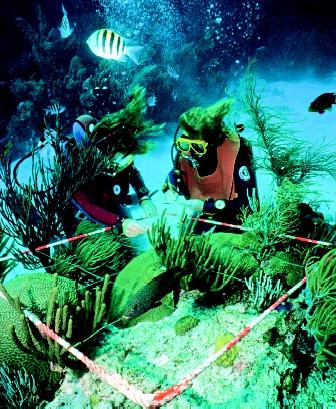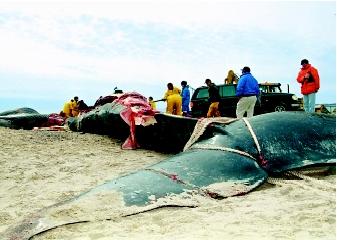Careers in Oceanography
Balancing on the deck of a research ship stationed a few miles out to sea; a crewman closes the vault-like door of a submersible. Two biologists share the submarine's rear passenger chamber, and two more share its front chamber. The scientists are preparing to dive 300 meters (1,000 feet) or more

On their descent to the bottom of the ocean, the deep-sea biologists will see creatures as bizarre as those in the story Alice in Wonderland, animals with surprisingly successful adaptations to what for humans would be unimaginably harsh conditions. In this world of eternal darkness, the oceanographers will be awed by creatures living in a netherworld to which few humans have ever traveled.
Oceanographers and Limnologists
Deep-sea biology, the study of life in the ocean's deepest realms, is but one area of research in the field of oceanography. Oceanographers apply the basic sciences to studies of the sea, its contents, and the surrounding environment. Often, oceanographers are chemists, physicists, biologists, or geologists who bring knowledge of those fields to studies of the oceans. Similarly, limnologists study lakes, rivers, ponds, streams, and other freshwater bodies. All these scientists collaborate with one another and with engineers, social scientists, journalists, policymakers, and others on complex, challenging problems as they work to expand knowledge of the world's oceans, lakes, and rivers. Oceanographers work in laboratories ashore, on ships and submersibles at sea, and in coastal environments.
Oceanography is a relatively new science. Research conducted in the twentieth century has given the scientific world the first global glimpse of how the oceans work. It is now known that the oceans, atmosphere, solid Earth, and living organisms are part of an intertwined global system. Many oceanographers and limnologists conduct studies related to changes in this global system, both natural changes and those caused by human activities.
Many oceanographers are currently working on answers to such questions and problems as predicting the impact of increased carbon dioxide and other greenhouse gas emissions; increased ultraviolet radiation resulting from ozone depletion; the effects of excess nutrients in coastal waters due to fertilizers, pesticides, or habitat destruction; the short- and long-term effects of increased acidity (acid rain) due to burning of fossil fuels ; and the impact of various fishing practices on commercially important marine animals like fish and lobsters.
Fields of Study
The study of oceanography is traditionally divided into biological oceanography, chemical oceanography, geological and geophysical oceanography, physical oceanography, marine engineering, marine policy, and science journalism. Many of the most exciting fields encompass two or more of these disciplines.
Pursuing a career in a marine-related field requires a good background in at least one area of science or engineering, along with mathematics. In marine policy careers, law, economics, or political science training is usually necessary. In science journalism, knowledge of science and journalism are combined. Specializing in one area too early can be a mistake. It is best to keep all options open, at least through high school and into undergraduate education. Only in graduate school must one begin to make choices.
Biological.
Biological oceanographers, marine biologists, and fisheries scientists study marine plants and animals. They are interested in how marine organisms develop, relate to one another, adapt to their environment, and interact with it. Among other things, their work includes developing ecologically sound methods of harvesting seafood, and studying biological responses to pollution .
Because marine biology is the best known and often the most popular field of oceanography, it is currently the most competitive. High school students wishing to work with marine mammals, for example, may number in the tens of thousands; even with a graduate degree, however, jobs in that subfield of marine biology are few and far between.
Chemical.
Chemical oceanographers and marine geochemists conduct research on the chemical composition of sea water, and its interaction with the atmosphere and seafloor. They analyze sea-water components; study the effects of pollutants; look at chemical processes—such as Earth's carbon cycle—that operate in the marine environment; and investigate chemical tracers (small amounts of dissolved substances that give water a certain

Geological.
Geological oceanographers and geophysicists study the ocean floor and its geologic structures, like seamounts , ridges, and trenches, to discover how ocean basins and other ocean structures are formed. They try to find out about the processes that created these ocean basins, and how the ocean floor and the waters above it interact. Their research on ocean rocks and sediment provides information about Earth's recent and long-ago history.
Physical.
Physical oceanographers examine ocean properties like temperature, density of sea water, wave motions, tides, and currents. They conduct research on how the ocean and the atmosphere together influence weather and climate. Physical oceanographers also study how light and sounds are transmitted through sea water.
Engineering.
Ocean engineers use scientific and technical information in practical uses like designing instruments for measuring processes in the ocean, and building structures that can withstand currents, waves, tides, and severe storms. Fields in ocean engineering include acoustics; robotics; electrical, mechanical, civil, and chemical engineering; and naval architecture.
Policy.
Marine policy experts combine knowledge of oceanography with an understanding of the social sciences, law, or business to devise policies, guidelines, and regulations for the wise use of ocean and coastal resources.
Journalism.
Science journalists who specialize in writing about aquatic subjects, whether oceans, lakes, or rivers, meld an understanding of oceanography and limnology with a knowledge of journalism and an ability to write. They may apply their talents in writing for newspapers and magazines, working in broadcast media (television and radio), as science news officers disseminating information about oceanography in government agencies and at universities, and in teaching science journalism.
Employment Opportunities
The marine sciences offer many employment opportunities. Those interested in pursuing research careers will find opportunities in academia, industry, government, nonprofit and nongovernmental organizations, consulting firms, and, in some cases—like aquaculture, the growing of marine life for food and medicines—owning their own businesses. Most consultants, however, have prior experience in some aspect of research or teaching before either venturing out on their own or joining a consulting firm. In an academic setting, most jobs involve conducting research and teaching undergraduate and graduate students, and require at least a master's degree and usually a doctor of philosophy (Ph.D.) degree.
Academic Careers.
University oceanographers usually spend at least some time each year engaged in fieldwork, collecting data and samples onboard small boats or large research vessels. They are generally affiliated with professional societies, such as the American Society of Limnology and Oceanography, through which they are able to keep up with the latest advances in their fields, present research results at scientific meetings in the United States and abroad, and build a network of colleagues. When not in the field or at meetings, these oceanographers spend a significant amount of time in the laboratory running experiments, or working on computers to analyze data or develop models. Oceanographers employed at universities also spend some time teaching.
Alternative Careers.
While research at a university was once considered the traditional career path for those with graduate-level degrees in the marine sciences, changes in academia and science funding opportunities have made this route far less certain. An increasing number of marine science master's and Ph.D. graduates are choosing so-called "alternative careers" as experts on the marine environment in almost any field where knowledge of the oceans is required. These careers may be found in government agencies at federal, state, and local levels; at places like aquariums; in law firms that need marine experts; in small businesses that seek aquaculturalists and mariculturalists; and in science journalism.
Administrative Jobs.
Many oceanographers have administrative jobs, either with academic institutions or with government or private agencies. These oceanographers spend more time in the office, writing reports and giving presentations on their recommendations. They also attend national and international conferences to keep abreast of developments in their fields.
Private Industry.
In private industry, insurance companies, for example, rely on oceanographers to predict and understand weather-related hazards and natural disasters. Transportation industries rely on similar information in shipping, whether by air or sea. Jobs in some nonprofit organizations (such as the Sierra Club, the World Wildlife Fund, and The Nature Conservancy) concentrate on environmental advocacy, whereas in other nonprofit institutions oceanographers may develop instruments, systems, and methods for exploring the seas.
Medical Research.
A new area in which graduates of oceanography programs, particularly biological oceanography programs, are finding employment is in medical research industries, including biotechnology. Information from current research is setting the stage for development of novel drugs that target a

Key Career Aspects
While academia is still the largest employer for oceanographers, a survey of marine scientists revealed several key aspects to a career in this field. First, oceanographers will likely hold a number of jobs in a variety of sectors, public and private. Second, most oceanographers can expect to change jobs fairly frequently. Finally, many entry-level career possibilities for new graduates, such as internships, externships, traineeships, and teaching and research assistantships, provide knowledge useful and sometimes critical to the next step. These commitments, lasting from several months to two years, will give early career oceanographers an edge over others who lack experience in the field. Volunteering is also an excellent way to break into a career in oceanography or limnology.
In addition to being good scientists, today's oceanographers and limnologists must also be good writers and speakers. Researchers need to submit proposals to funding sources in attempts to acquire financial support for their research, and they must present the results of that research to colleagues, decisionmakers, students, and funding agencies. As one leading oceanographer has said, "Marine science does no good unless it is communicated to others."
SEE ALSO Ecology, Marine ; Moorings and Platforms ; Oceanography, Biological ; Oceanography, Chemical ; Oceanography, Geological ; Oceanography, Physical ; Submarines and Submersibles .
Cheryl Lyn Dybas
Bibliography
Doyle, Kevin, Tanya Stubbs, and Sam Heizen. The Complete Guide to Environmental Careers in the Twenty-First Century. Washington, D.C.: Island Press, 1998.
Kreeger, Karen Young. Guide to Non-Traditional Careers in Science. Philadelphia, PA: Taylor & Francis Publishers, 1999.
National Sea Grant College Program. Marine Science Careers: A Sea Grant Guide to Ocean Opportunities. National Oceanic and Atmospheric Administration, 2000.
The Oceanography Society. Careers in Oceanography and Marine-Related Fields. Washington, D.C.: The Oceanography Society, 1995.
Internet Resources
ASLO. American Society of Limnology and Oceanography. <http://www.aslo.org> .
Sea Grant Marinecareers.net . Woods Hole Oceanographic Institute and New Hampshire Sea Grant Program. <http://www.marinecareers.net> .
Comment about this article, ask questions, or add new information about this topic: